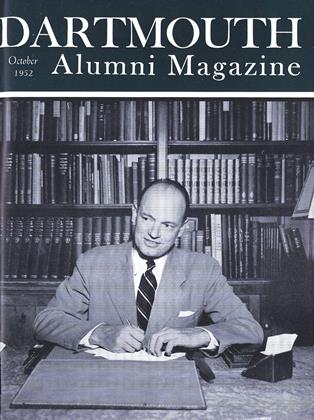The phrase "Ivy Group" was used by the presidents of Brown, Columbia, Cornell, Dartmouth, Harvard, Pennsylvania, Princeton and Yale in their July 9 announcement of a new agreement renewing and strengthening their 1945 compact on football and other athletic policies. The press was quick to pick this up as a step toward formalizing what has been popularly known as the Ivy League for a great many years.
In the new Ivy Group Agreement, trie presidents of the eight colleges confirmed last February's abolition of spring practice and post-season games, tightened eligibility rules, and agreed that beginning in 1953 each member of the group will meet all other members in football at least once in every five years. Foremost among the innovations, however, was the creation of a Presidents' Policy Committee which assigns the full and final responsibility for athletic policies to the presidents themselves. Assisting the presidential policy committee will be a Committee on Administration, on which Dartmouth is represented by Director of Athletics McCarter, and a Committee on Eligibility, on which Dartmouth's representative is Dean McDonald.
The Ivy Group presidents expressed the belief that when under proper control "intercollegiate competition in football and other organized athletics offers desirable development and recreation for players and a healthy focus of collegiate loyalty." They also stated: "It is in the spirit of this agreement that it shall be carried out through wise and flexible administration and in a setting of mutual respect and confidence among the members of the group as institutions having a common dedication to the purposes and principles of higher education.
The stricter eligibility rules adopted by the Ivy Group included these principal changes:
(1) Required for the first time that students, to be eligible for a varsity team, must file a written statement agreeing to abide by the policies of the Presidents' Agreement.
(2) Ruled that, that in addition to limiting eligibility to three academic years, any year missed through scholastic or disciplinary ineligibility shall nevertheless be counted as one of the three academic years.
(3) Required that a student, to be eligible, be making "normal academic progress, both quantitatively and qualitatively, toward a recognized degree.
(4) Ruled that no student entering after September 1, 1953, shall be eligible whose secondary school education was subsidized or whose post-college education is promised by an institution, by an individual or group of individuals not closely related to the family as a consideration for his attending the particular institution.
In its present form the Ivy Group Agreement deals almost entirely with football. The presidents have already expressed their general concern with other forms of intercollegiate athletics, and now that the Ivy colleges have drawn closer together than ever before, it is not unlikely that group policies will be agreed upon for other sports as well.
 View Full Issue
View Full Issue
More From This Issue
-
 Article
ArticleDaniel Webster's College Days
October 1952 By EDWARD CONNERY LATHEM '51 -
 Article
ArticleThe New Dean . . .
October 1952 By JOHN HURD '21 -
 Article
ArticleDartmouth Men Active In the Big '52 Fight
October 1952 By C. E. W. -
 Class Notes
Class Notes1918
October 1952 By ERNEST H. EARLEY -
 Class Notes
Class Notes1905
October 1952 By GEORGE W. PUTNAM, GILBERT H. FALL -
 Class Notes
Class Notes1948
October 1952 By FRANCIS R. DRURY JR., ROBERT L. MERRIAM














